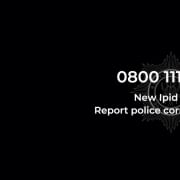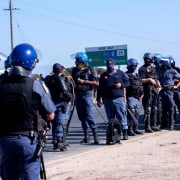|
Getting your Trinity Audio player ready...
|
 The release of the latest crime statistics might show some progress in certain areas, but anti-corruption agencies still have little to rejoice over.
The release of the latest crime statistics might show some progress in certain areas, but anti-corruption agencies still have little to rejoice over.
Speaking in Pretoria this morning, police minister Nathi Mthethwa revealed that between April 2012 and March 2013, murder, attempted murder and property-related crime has increased, while common assault, crimes against women and ATM bombings has decreased. Mthethwa did not give actual figures, only percentages.
The public dissemination of these figures is useful because it shows transparency and accountability in the police department, and also because knowledge of crime trends and the extent of different types of crime is important in enabling communities to develop interventions. This could even ease the burden on the police force.
However, since corruption stats are not specified, and corruption itself is mentioned only as a sub-category of commercial crime, there is nothing that can be used to enhance current anti-corruption efforts.
As with the year before, Corruption Watch’s executive director David Lewis reiterated his belief that fraud cases should be categorised as corruption when they involve the misuse of public resources. Lewis said: "While we understand that corruption is difficult to measure, it is a serious crime and widely perceived to be rapidly increasing. In fact, the Prevention and Combatting of Corruption Activities Act of 2004 clearly lays out a definition of corruption and the steps to be taken when corruption is suspected or proven.”
Corruption Watch provides several ways in which anybody can get involved in exposing corruption:
- You can fill in our online form
- You can call our schools tip-off line on 0800 023 456
- You can send an SMS containing the word BRIBE to 45142 (R1 per SMS)
- You can send an email to info@corruptionwatch.org.za
- You can post a snail-mail letter to PO Box 113, Parklands, 2121.
Confidence in police takes a dive
At a briefing held a few days before Mthethwa spoke to the media, Gareth Newham of the Institute for Security Studies remarked that not only was no detail provided in the annual stats for important categories of crime such as corruption and domestic violence, but that the stats themselves were up to 18 months out of date by the time they were released.
This essentially negates any possibility of the stats contributing usefully to public monitoring purposes, and also does nothing to inspire public confidence in the police force. According to Transparency International’s 2013 global corruption barometer, 83% of the South African public think that the police are corrupt or extremely corrupt.
This has a negative impact on the incidence of reported crimes and on police-community relationships.









